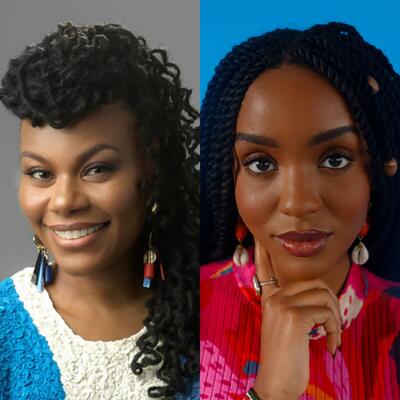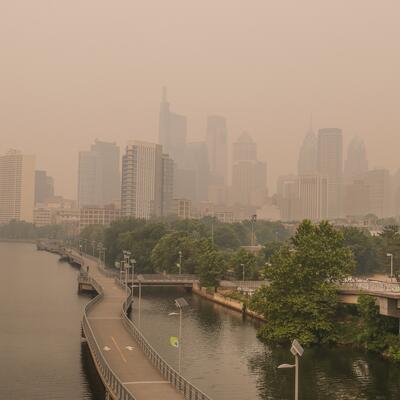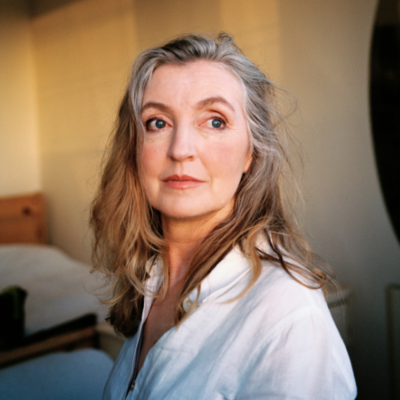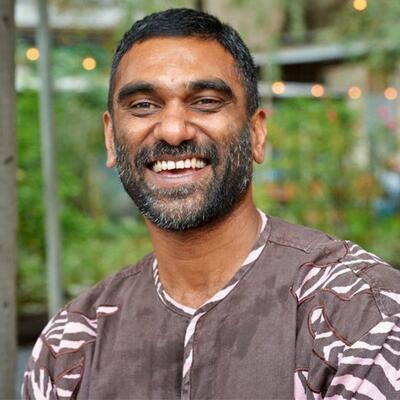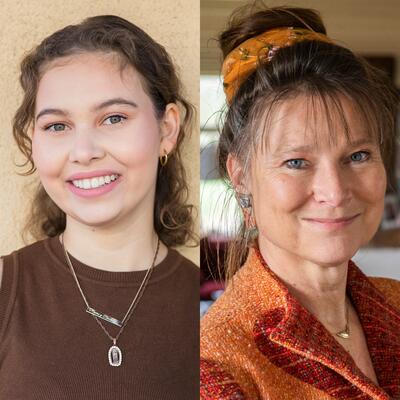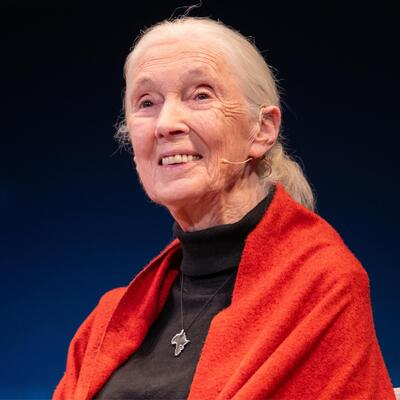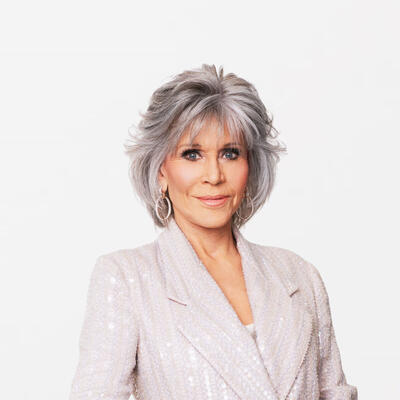
Jane Fonda: A Lifetime of Activism
Guests
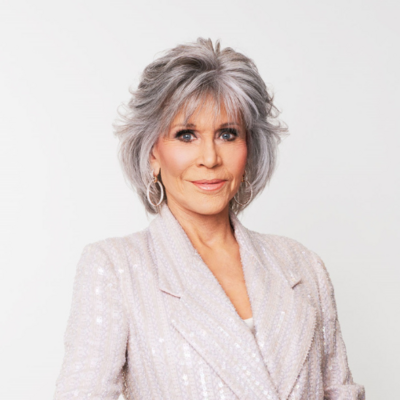
Jane Fonda
Summary
Jane Fonda has been many things: an actor, fitness guru, and mother, but through it all, her activism has remained her true calling. For decades she’s been a passionate critic of the Vietnam War and supporter of Indigenous, LGBTQ and women’s rights.
Inspired by Naomi Klein and Greta Thunberg, in 2019 she began protesting on the steps of the U.S. capitol in an action she called “Fire Drill Fridays” – to bring awareness to the urgency of the climate crisis.
“A majority of Americans, like 70%, are very concerned about the climate. But they haven't taken action. And they say because they haven't been asked. This is our job now. To reach the great unasked,” she says.
Fonda has empathy for fossil fuel workers and plenty of rage for fossil fuel executives.
“They knew 40 years ago that what they were burning was going to destroy the planet. They knew and they didn't stop drilling,” she says. Fonda has also launched a climate PAC with the goal of defeating political allies of the fossil fuel industry.
“That's all we focus on, is getting out the oily electors, especially the Democrats, and we primary them strategically. And we want to get climate champions elected to office, up and down the ballot. Because right now, you can't get much done in Congress right now. But down ballots, state legislatures, city councils, supervisors, controllers, they have such power, you have no idea how much influence they could have over this climate crisis.”
Over a lifetime of activism, she’s realized the power of taking a stand and speaking out for what she believes in, as well as fighting for those with less privilege.
“I have found that every single time I start to get depressed, if I take action it disappears. Greta Thunberg said, don't go looking for hope, look for action and hope will come. And she's right.”
Episode Highlights
5:00 – Childhood connection to nature
9:00 – Social awakening in France around the Vietnam War
11:30 – Working with active duty soldiers opposed to the war
13:00 – Discovery of her own privilege
14:40 – Relationship with Tom Hayden and involvement in Indigenous rights
21:00 – Creation of a counter-program for military troops
25:00 – Inspiration for climate activism from Greta Thunberg and Naomi Klein
27:00 – Fire Drill Fridays protests
29:30 – Being arrested for protesting climate inaction
35:00 – Role of electoral politics in climate action
37:50 – Climate One lighting round
46:00 – Fossil fuel executive's responsibility for climate disaster
49:00 – Gavin Newsom setting oil and gas setbacks
Resources From This Episode (2)
Full Transcript
Note: Transcripts are generated using a combination of automated software and human transcribers and may contain errors. Please check the actual audio before quoting it.
Greg Dalton: This is Climate One, I’m Greg Dalton.
Ariana Brocious: And I’m Ariana Brocious.
Greg Dalton: I am so excited about today’s guest: the incredible Jane Fonda. Jane has been many things: an actor, fitness guru, and mother, but through it all, her activism has remained her true calling.
Jane Fonda: And I have found that every single time I start to get depressed, if I take action it disappears.
Ariana Brocious:The passionate critic of the Vietnam War and supporter of Indigenous rights has empathy for fossil fuel workers and plenty of rage for fossil fuel executives.
Jane Fonda: They knew 40 years ago that what they were burning was going to destroy the planet. They knew and they didn't stop drilling.
Greg Dalton: I loved her show Grace and Frankie. And I’ve been aware of her activism for decades but it was when she turned to climate that I really started paying attention.
Ariana Brocious: And though, Greg, you and I are of slightly different generations, I loved also Grace and Frankie. I thought it was a hilarious show. I started to notice Jane through her fitness empire as many of us did. But really I began paying attention to her when she began her climate protests. This began back in 2019. Jane was inspired by Naomi Klein and Greta Thunberg, and she began protesting on the steps of the U.S. capitol in an action she called “Fire Drill Fridays” – to bring awareness to the urgency of the climate crisis.
Jane Fonda: A majority of Americans, like 70%, are very concerned about the climate. But they haven't taken action. And they say because they haven't been asked. This is our job now. To reach the great unasked.
Greg Dalton: She got a lot of attention because she’s a famous person; she brought a lot of her famous buddies along and they quickly turned to mic to people of color, younger people, who don’t have as much fame and power. What I was most excited to talk with her about was her life journey, her craft and her values. And what really resonated with me was her ability to hold conflicting and complicated emotions at the same time - rage at fossil fuel executives for their deceit, and genuine empathy for rank and file workers in the oil and gas industry. We rarely hear those two things in the climate conversation.
Ariana Brocious: Yes. Though we could probably stand to have more of that. I was also moved by her reflection on discovering of her own privilege and how that inspired her to take action and be involved in those causes.
Greg Dalton: Elites are sometimes reluctant to get involved in social change because they have a lot to protect and a lot to lose. I vividly recall when Michael Brune, then-head of the Sierra Club, got arrested in front of the White House. He did that after the Sierra Club ended a 120-year-old ban on employees engaging in civil disobedience. And since that time I have wondered how bad and desperate the climate needs to get before I cross a line that puts at risk things I hold dear. I don’t know where that line is, but I do respect people who have done that, scientists and others, who put their careers and bodies on the line. I do know we’re not gonna solve the climate crisis by elites remaining very comfortable and cautious and safe.
Ariana Brocious: Jane Fonda was recently in San Francisco and joined you for a conversation recorded in front of a live audience at the Herbst Theater. And this is a special place, right Greg?
Greg Dalton: Right. I talked with Jane on the same stage where the UN charter was signed in 1945. That’s meaningful to me because it reflects a powerful moment in history when great powers came together to address collective interests and support peace. And of course, the UN is central to addressing the climate crisis.
Greg Dalton: Around that time when the UN charter is being signed here, you were a school child growing up. And your home was not a happy place. Your father, Henry Fonda, played many iconic roles, including Abe Lincoln. And you said that you grew up in the shadow of a national monument. Your mother struggled with mental health and you found solace outdoors, climbing trees, getting to know the bugs and creatures in nature. How did that connection with the natural world shape you and who you are today?
Jane Fonda: Finding solace in nature when you're a young child, you know, if it's not a happy home…there's always the trees and the flowers, and my desire growing up was, I wanted to be a, I didn't know the word Indigenous, I wanted to be an Indian boy. Sometimes I wanted to be the Lone Ranger, sometimes I wanted to be Tonto, yeah. Because of the way they were with nature. The symbiotic relationship, the knowledge that you were part of nature, that nature was a living thing that you were part of. And I grew up at the end of a dirt road, up on the top of a hill overlooking the ocean. There were no other houses anywhere. And there were bobcats and mountain lions and coyotes and... meadowlarks and, you know, if you have loved these things as a child and then they're not there anymore. I mean, where are the meadowlarks? Do you know that there are three billion fewer birds now than we had in 1970. And if you're like me, I loved bird songs. That leaves a hole in your soul, you know, and every summer I spent all my time in the ocean at the Santa Monica Bay. And you can't go swimming there now. And then whales are washing up dead. And we know why. But I love whales. I scuba dive with penguins and marine iguanas and sea turtles and when you've been face to face with a sea turtle, no really, and you look into those eyes. You know that you're part of that. And I'm sure that all of you saw “My Octopus Teacher.” Which I've seen about five times. Right? Yeah. I mean, they're sentient creatures. And I just kind of knew that intuitively as a child. And so I always cared.
Greg Dalton: Yeah, that you're part of nature. It's not something to dominate or extract resources from. You reveal a lot about your feelings and your relationship with your parents, food, your body, in a fabulous HBO documentary that I highly recommend called Jane Fonda In Five Acts, and it's fabulous, fabulous. It's amazing how much you reveal. So vulnerable, and what an amazing, amazing story. And in that, I learned that in 1968, you were living in Paris, and your mentor, Simone Signoret, a member of France's intellectual left, invited you to a large protest against the Vietnam War. And you write in your memoir that, “For the first time, I felt embarrassed for my country. I also wanted to go home.” So, take us to that moment when you went to your first protest. I'm not sure you could even find Vietnam on a map at that point. What powerful awakening was that for you?
Jane Fonda: Well, my father was a decorated Navy officer in the second world war, and it was a very important time for him. And I just grew up assuming that any place that U.S. troops were fighting, we were on the side of the angels. We all want to feel that we have meaning in our lives, you know, we all want to be able to say, why am I here, and I know that there's a reason, and, boy, I was so far, I didn't even know I was supposed to ask myself things like that. Anyway. I fell in love with a Frenchman, and I moved there, a director, and he directed Barbarella, and been married to Bardot and Deneuve before me. I mean, it was complicated. And, I remember, I remember very well, we were in Saint Tropez, and it was when Johnson started bombing North Vietnam. And, it was in the headlines of the paper, and my husband, Vadim, looked at that and he said, you know, [speaks in French]. He could not believe that our elected officials were so stupid as to believe what they were being told and to go ahead and permit this to happen. And I thought, well, who the hell does he think he is? Sour Grapes, just cause you all lost. I didn't say this out loud. But, you know, the French had colonized Vietnam and the Vietnamese had beat them, too. And, so I just thought it was sour grapes. I really didn't know, I didn't know where Vietnam was. And Simone Signoret had kind of had a crush on my dad. And so when I went to France to make a movie, she, being the elder she was, took me under her wing. We ate meals together a lot, and that's where I learned that the French eat forever and drink wine forever into the night, and it was so great. Anyway, she used to bring me to anti war demonstrations where Simone de Beauvoir was speaking, and Camus was speaking, and Sartre, and it was, it was, Interesting. I didn't understand any of it, really. And then in 1968, I was extremely pregnant, and American soldiers who had fought in Vietnam and then left, deserted, resisted, came to Paris, and Calder. That's whose home they stayed in, but they didn't have clothes, and so they were in dentists and doctors, and so they would look for compatriots who lived there to help them, and so a group of them sought me out, and I said, well, why did you leave? What's going on? And they told me stories about how American troops were treating civilian soldiers, and I didn't believe them. I could not believe in... They gave me a book by Jonathan Schell called The Village of Ben Suc. It was a small book and I read it in one sitting. And when I finished that book, I was a different person. It was a book about how the government had requested that civilians be rounded up and put in these kind of stockades. I determined right then that I was going to, I couldn't stay in France. I didn't want to be criticizing my country in another country. That I had to go home. And I left my family and I came back. And so the first people I went to, to know what to do, were GIs. I became part of the GI movement, which was... active duty soldiers, and sailors, and marines, and air force, I mean, it was all branches of the military. And outside a lot of the bases, there were these coffee shops that had been created by anti war activists as places where soldiers could come to learn about Vietnam, to learn the history, and, and things like that. And there was one called the Oleo Strut outside of Fort Hood in Killeen, Texas. It was one of the first coffee shops, coffee houses that I went to and what really did it for me was a woman named Terry Davis. It was always the women that I met who were part of the anti war movement. You know, I had never met people like that. I knew so many friggin rich people. I can't tell you. I mean, people who ran countries and huge corporations. And I'd seen all of the wealth in the world. And smart people and stuff. But this woman to me epitomized what took over my soul. Her name was Terry Davis. And she didn't treat me like a celebrity. She saw me. I was supposed to lead a rally in the following week with soldiers that were going to come. She wanted to be sure I felt okay about it, what I was going to say, she, being with her was like looking through a keyhole at the world that we were fighting for. It was like getting into a warm bath. And I realized, there's a lot of these people in the world that are totally different then the people that I've grown up with. I want to be like them. They were all women. It was a profound, soul altering experience for me.
Greg Dalton: Coming up, how Jane Fonda became inspired to direct her activism toward climate:
Jane Fonda: Greta Thunberg said, don't go looking for hope, look for action and hope will come. And she's right.
Greg Dalton: That’s up next, when Climate One continues.
This is Climate One. In addition to her work with military veterans, Jane Fonda became a supporter of Indigenous rights. Let’s get back to my conversation with the activist and actor recorded in front of a live audience in San Francisco.
Greg Dalton: In 1972, Tom Hayden wrote a book called, “Love of Possession is a Disease with Them.” What about that book captured your mind?
Jane Fonda: How can I even describe this? I wanted to be an indigenous boy. Because I could gallop, full speed, bareback, on a horse through an avocado grove and did all the time. I mean, because I was like an Indian. I mean, that's what I really did. and then...Well, just one little, God, I hope I don't talk too much.
Greg Dalton: Not at all. That's why we're here.
Jane Fonda: Between reading the book, between reading this book by Jonathan Schell, and having my life turned inside out, and then giving birth to my first child. And then everybody was going, everybody, the Beatles and Mia Farrow were going to India to find truth. So, I wanted to find truth. So, I went to India by myself, and I trekked all through India, and Nepal, and Sikkim, the place was full of Americans in saffron robes like they were, you know, Buddhists and they were getting stoned and they were telling you, here's a joint and, you know, come to the ashram and I had never been in the third world before. I had never seen abject poverty before and I was just like, holy s***. I don't want to go to an ashram, I want to join the Peace Corps. And that's where I realized that, oh, oh, I want to do something about this. Anyway, I flew from there, this is right after I made They Shoot Horses, Don't They? Flew to Beverly Hills for a press conference to promote the film. I remember I woke up the next morning and looked out the window and thought there's been a plague. Because I had spent two weeks in India where noise and smell and sounds and this was quiet. I thought something has happened. There's been a plague. But, as I got off the plane, you remember Ramparts Magazine? It was on the stands and on the cover was a Native American woman, Lineta Means. She became my friend later and she was holding up her fist. And behind her was a whitewashed brick wall that said, Better Red Than Dead. So I bought it. I'd never bought Ramparts before. And it was an article by Peter Collier. He's since become, like, Tucker Carlson, he's become a right winger, but it was a great article about the history of what white settlers had done to Native Americans in this country. My father had done all these movies, and I had never known this history, I'm ashamed to say. And I thought to myself, why did I go to India? And I called Peter Collier, and I said, I want to go to Alcatraz. It was an article, it was motivated by the occupation of Alcatraz, by the indigenous students in Berkeley. And I went. Peter Collier brought me there. And that, and, and that was kind of like the first thing that I, that I, what was the question? Really, I'm, I'm sorry.
Greg Dalton: When you read Love of Possession as it–
Jane Fonda: Oh yeah, so, so, I, it was like, there was the war and then there was this war that we'd waged against indigenous people here And, and it seemed similar. And then I heard that this guy, Tom Hayden, had written this book, “The Love of Possession is a Disease With Them,” a quote from, I think, Black Elk. And, I knew I was going to marry him. I did. And I did. But mostly because the first date we had, I gave a slideshow in downtown Los Angeles, and it was all about the kind of bombs we were dropping, which were illegal. The same ones we're giving to Ukraine right now, by the way, cluster bombs and things like that. So, I was trying to show, because Nixon was trying to persuade people that the war was winding down because he was bringing home the ground troops, but in fact it was escalating the war, and so I was talking about that air war. It was all facts and figures and stuff like that, and this guy shows up. It was Tom, and he had black rubber sandals. The kind that the Vietnamese made out of American airplane tires. Just saying. And he had a beaded headband, and he had a braid down to his waist, and of course I knew I was going to marry him. And he saw my slideshow, and then he said, can I show you mine? And I went home and I said to my roommate, I've just met the man I'm going to marry, and he came over the next day and he showed me his slideshow. And this is what is important about somebody like Tom Hayden. It mentioned the bombing and everything. But it was about the Vietnamese people. It was about what we were destroying when we bombed these villages and destroyed these rice paddies. It was about the fact that the Vietnamese had been fighting for thousands of years against the Chinese, and the Mongols, and the French, and the Japanese, and they had always won. And he talked about why that was probably so. Great legends of strong sisters. He talked about the women who are now, there. He showed a slide show, a slide of an advertisement by a plastic surgeon to make their slanted eyes more like western eyes. And that, and breast implants, which I had had. And so when I realized what, what we were doing, not just the bombing and the killing, but the destruction of that ancient Buddhist culture, so of course I married him. I mean, and it, again, it changed, it changed how I viewed the war, how I viewed the Vietnamese, and it was the framework that undergirded me when I went there a few months later.
Greg Dalton: So the connection, the affinity with indigenous people started very young. You connected that with sort of the bombing of Vietnam, the decimation of indigenous cultures.
Jane Fonda: Can I just interrupt once? I just want to say something because I don't want to give the impression that I was not an activist until Tom came along. Because what ended up happening was... I created a show called FTA, f*** the Army, based on G. I. magazines. The coffee houses got the G. I.s to print magazines, and that was the name of one of their magazines. And it was a counter to the Bob Hope show. Bob Hope, who said in one of his shows, Oh, bombing of North Vietnam, it's the greatest slum clearance program we've ever had. I mean, you know. So, we, a bunch of us went over there, Donald Sutherland and, and, and Michael Alimo and Rita Martinson and Len Chandler who, rest in peace, just died a few days ago. And we performed to 60,000 soldiers in the Philippines and Hawaii and Japan and Okinawa. An anti war show. It was great. And I thought that that was a pretty cool thing. It turns out that the thing that worried Nixon the most about the anti war movement was the G. I. movement. That was what obsessed him. He was so worried about it.
Greg Dalton: Very credible messengers that are not coastal hippies, yeah, those different messengers. On Thanksgiving Day in 2016, you went to Standing Rock to protest the Dakota Access Pipeline. Candy Mossett, a 37 year old member of the Mondan, Hidatsa, and Akira Nation was quoted in the Guardian as saying, “What's the narrative here? Oh, we want to help the poor Indians on Thanksgiving of all days. We're trying to make people understand we don't need celebrities to come and feed us and get a photo op and just leave.” How does it feel to hear those words now?
Jane Fonda: It’s fine, it wasn't referring to me. What I brought was 15,000 pounds of bison and yurts, because it was very, very cold. It happened that another person that I know brought a lot of turkeys and roasted them. It was kind of fun, the way it was done. And I helped serve them, but no, I went there with yurts and bison meat. And the courage that they were showing was enormous, but the thing that made me the happiest to see, when I was, when I was at Alcatraz, there was a real schism. There were those, um, American Indian Movement wanted to assimilate, they, you know, they wanted to leave behind the ceremonies and all of that, if I understand correctly. And then there were those who, you know, like Thomas Banyaka, the Hopi spiritual leader, was there. It was the first time that Wilma Mankiller had met a spiritual guide. And, and, there were those who were saying, no, we need the prayers and the sweat lodges and so forth. And when I got to Standing Rock, it was the prayers and ceremonies and sweat lodges that had won out. There were so many young people who said that those ceremonies had helped them kick booze and drugs and they were very into it and that's a really good thing. I think.
Greg Dalton: I don't think anyone accuses you of celebrity photo op activism. Eckhart Tolle in his, in a book, “A New Earth,” said, “Whatever behavior the ego manifests, the hidden motivating force is always the same. The need to stand out, be special, be in control. The need for power, for attention, for more.” How do you think about your own drives and ego and your own climate activism? Because a lot of activism is about, I'm right, look at me, do the right thing, what I say.
Jane Fonda: Well, that's totally why I'm there. I mean, that's the...I mean, why else? No, actually, for me, it's very selfish. I was really going down a rabbit hole of despair. I was very heartened by that incredible outpouring of activism globally, led by Greta Thunberg in 2019. But I didn't know what to do. I knew I had a platform, and I wasn't doing enough, and I was so depressed. And then I read Naomi Klein's book. I had read all her books, but this was a smaller book, and it was just, it arrived the day I was leaving to go up with friends of mine to Big Sur. The galleys of “On Fire: The Burning Case for a Green New Deal.” And so I got there, I got up there to Big Sur and I sat down and I read the book, and it hit me. You know, when you're ready for it, maybe one of you would read the book now and it wouldn't have this impact, but to me it was like I could feel a lightning bolt hit my solar plexus. And I found a place that had a signal. It was just like one foot. And I called. And I think it's one of the smartest things I ever did in my life. I called Annie Leonard. Because I knew that she was really brave and bold. And she'd done such great things at Greenpeace. And I said, I want to move to D. C. And I want to camp out in front of the White House. And I want to raise a ruckus. And my only concern is I don't know where to poop. See, I have, you know, I love to climb mountains. I do my best above 14,000 feet. I have pooped in the wilderness. And I know what to do, but not in a city. I didn't know what to do. And she laughed and she said, I'm really, I'm so happy that you want to put yourself on the, your body on the line like this, but you don't have to worry about pooping because it's illegal now to camp in front of the White House. But she said, Okay, let me think about this. And she set up, uh, the next day a conference call with Bill McKibben and Naomi Klein and then Jay Helfon. I thought, what's she got a lawyer on here for? Because now I understand because I know Jay Helfon. But at any rate, it was at Esalen. It was the only place that had a payphone and I had to borrow a lot of quarters and it was a long time. So hot. And putting quarters in. But that's where Fire Drill Friday was born. We didn't have a name for it yet, but the idea of engaging in a rally and then civil disobedience every Friday and anyway. And the moment that that happened, my depression disappeared. And I have found that every single time I start to get depressed, if I take action it disappears. Greta Thunberg said, don't go looking for hope, look for action and hope will come. And she's right.
Greg Dalton: Yeah. Yeah, there's research that backs that up, that doing, it helps, and the community you find in doing is part of that, the relationships, it's the action in concert with other people. So you were arrested with a bunch of celebrities,
Jane Fonda: And a bunch of non celebrities. I mean, this wasn't just all about, what I loved about it is celebrities introduced frontline activists, you know, who normally whose voices wouldn't be heard and it was all recorded and we have it in perpetuity and hundreds of, I mean, lots and lots and lots and lots of people watch this stuff. And people travel from all over the country, mostly women, mostly older women.
Greg Dalton: And many of whom watched your videos and that's why they were there.
Jane Fonda: Well, they like Grace and Frankie too. You know, I mean, I've been out there in the trenches as an activist when people really hated me. And then I've been out there in the trenches when I was in Grace and Frankie and people loved me. And so I've been at both, and it really helps to have a good, successful TV series behind you if you're going out there.
Greg Dalton: When you were arrested in Washington, D. C., it was your first time since the 1970s. You had your mugshot taken. You were handed a bologna and cheese sandwich. You were locked in your cell. Take us to that moment. What were your thoughts and feelings? When click, you're in a jail cell in Washington, D. C. for protesting on climate.
Jane Fonda: This may sound weird, but when you are putting your body on the line for something that you would give your life for, the deepest thing you can possibly believe in, there is, while they're putting the handcuffs on, those white plastic things, they hurt like hell. But you feel so liberated. I felt so free. It was weird, huh? But, you know, I'll have to be honest. I'm white, I'm famous, I'm privileged. So I knew they weren't going to hurt me. They weren't so nice in Cleveland the first time that it happened. But I knew that I was safe. So, it was really my job to kind of like record what was going on, and what was going on were men and women of color, because this was just the overnight holding place where we were. Psychotic breaks, screaming all night. You know, we just don't, in this country, know how to handle mental health crises. These people should never have been in a jail. They should never have been arrested. And it was just, you know, it was... I was fine, but I just was... The next morning, I was taken out of an individual cell and put into a holding cell with about 12 other women, all of them African American. One of them was really cold. She was so beautiful and she was shivering. I gave her my red coat for a while. And then they got worried that I was cozying up to these people too much and so they took me out and moved me away. But, you know, here's the reality. They said, why are you here? And I said, I was protesting the climate crisis. You know, just barest survival is on their minds. How do I get my next meal? How do I buy my next hit? I did not try to proselytize while I was there. I felt pretty helpless actually.
Greg Dalton: On Climate One today a conversation with activist and actor Jane Fonda. Coming up, she explains her theory of change:
Jane Fonda: Protest matters if the numbers are large and the demands are strategic. So that's one half of the strategy that has to happen.
Greg Dalton: Hear the other half of her strategy when Climate One continues.
This is Climate One. I’m Greg Dalton. Jane Fonda attracted a lot of attention for her climate protests called Fire Drill Fridays, where she wore her bright red coat in Washington D.C. She and many others were routinely arrested. I asked her what she thinks those protests accomplished.
Jane Fonda: We were not, as has been reported in the press, our goal was not to affect the government. We know from the Yale Climate Communications Project that there are a majority of Americans, like 70%, are very concerned about the climate. But they haven't taken action. And they say because they haven't been asked. The great unasked. This is our job now. Is to reach the great unasked. So that's what, we got a lot of press. We had a great press guy working with us, Ira Arlick. And the word got out that this old lady, you know, I turned 81 when I was in jail. And I knew that people would say, Well, God, if she can do it. So, people started coming from all over. I mean, Portland and San Francisco and all over, Wisconsin and they'd never been at a rally before. They'd never been arrested, but they did it and they felt great about it. Yeah. So, that was my, I was asking the great unasked to join, to move beyond concern into action.
Greg Dalton: Let's discuss how you think societal change happens–
Jane Fonda: Because there's got to be two prongs to what needs to happen. One is there have to be unprecedented numbers of people in the streets, peacefully, nonviolently disrupting business as usual. This is what got Roosevelt to create the New Deal. There were thousands and thousands of people in the streets, unions in particular, demanding, demanding the things that he does, he would, that he needed, that needed to be done. And he met with some of them, and they told him what they wanted. And you know what he said, and this is so important, he said, Okay, now go out and make me do it. That's really an important lesson. You know, in 1970, First Earth Day, do you know how many people came out? 20 million. 20 million people came out on First Earth Day. And you know what happened because of that? Nixon created the Clean Water Act, the Clean Air Act, and the EPA. A conservative Republican, you know, protest matters if the numbers are large and the demands are strategic. So that's one half of the strategy that has to happen.
Greg Dalton: And the other half is, some people say electoral politics has failed us. We have a cash and carry Congress. Do you think electoral politics matters?
Jane Fonda: Well,yeah, if you can't change the people, change the people! Annie Leonard gave me that line. Yeah , Democrats, there are all these Democrats who take money from the fossil fuel industry and they will not let good legislation pass. It almost happened with the Build Back Better bill. And one of the important parts of the big Build Back Better bill was a provision that called for cutting the 20 billion we taxpayers give to the fossil fuel industry every year. That would be such an important thing to have happen. And Henry Cuellar, a moderate Democrat who takes money from the fossil fuel industry in Texas, and four other oily Democrats, persuaded Nancy Pelosi to take that provision out. Okay, now, Cuellar was up for reelection. Running against him was a young Hispanic woman named Jessica Cisneros. Henry Cuellar is also anti choice. He's not only pro oil, he's anti choice. The Democratic Party backed him. She lost by 800 votes. She's a climate champion and brave and bold, pro choice, and she lost by 800 votes. This has to change. Because it doesn't matter how many thousands of people you have in the streets, the Joe Manchins of the world aren't going to pay attention. You have to get people who will care about what we're demanding, and be serving people and not corporations. And that's what the Jane Fonda Climate PAC is all about. That's all we focus on, is getting out the oily electors, especially the Democrats, and we primary them strategically. And we want to get climate champions elected to office, up and down ballot. Because right now, you can't get much done in Congress right now. But down ballots. Legislatures, state legislatures, city councils, supervisors, controllers. They have such power, you have no idea how much influence they could have over this climate crisis. And they don't get support. Every dollar that goes to them means so much. And you know, Jane Fonda comes along, I can increase the amount of money they make, I can get volunteers to come out, get media, it really, really helps. Last year, we endorsed 60 candidates, 42 of them won their general election. And I went on the road with some of them. And I can't tell you, they're mostly women, many women of color. Brave women, brave people. If you could go out with me, you'd have enough hope for the rest of your life. They're there and they're ready and we have to support them.
Greg Dalton: It's time for our lightning round. This is our Climate One tradition where we have true or false questions with Jane Fonda. True or false, you ate a lot of canned food growing up because your mother was afraid of running out of money.
Jane Fonda: True.
Greg Dalton: True or false, your son Troy was potty trained in a bunker in Vietnam.
Jane Fonda: A school, not a bunker.
Greg Dalton: School. Okay. True or false, his first 13 birthdays were fundraisers.
Jane Fonda: Yeah. I was married to Tom, you know, it's...
Greg Dalton: True or false, you wish you had a husband today?
Jane Fonda: No. No, no, in the words of the great Eve Ensler, I have closed up shop due to flooding.
Greg Dalton: True or false, For much of your life, you've been searching for someone real inside.
Jane Fonda: Yeah. You mean like, my, myself? Yes.
Greg Dalton: True or false, the need for carbon free power is so important that existing nuclear power plants in the U. S. should be kept running as long as safely possible.
Jane Fonda: True.
Greg Dalton: True or false, it's okay to buy real Christmas trees because they're typically grown on cleared and often degraded land.
Jane Fonda: True.
Greg Dalton: True or false, you wish Democrats would nominate someone other than Joe Biden for president in 2024.
Jane Fonda: Uh, no, I mean. It's not going to happen, there is no, we don't have a very deep bench. I mean we do, we have plenty of, I mean Elizabeth Warren could take it on like crazy, but, you know, we, the important thing is that we win. Right? And, when you vote, you're not marrying the guy. Or even asking for a date, it's pragmatic. I would rather push an ally than be stopped by a fascist. And that's what the choice is going to be in 2024.
Greg Dalton: True or false, you and your husband Tom Hayden got the idea to create a business to fund your activism from Lyndon LaRouche, the far right conspiracy theorist.
Jane Fonda: Correct.
Greg Dalton: True or false, you have an induction cooktop in your home.
Jane Fonda: No. I will, though.
Greg Dalton: We can change that. True or false, you are most yourself when you're with your women friends.
Jane Fonda: True.
Greg Dalton: Second part of the lightning round is we have, I'm going to mention a noun, and you will say one word or phrase that comes to your mind from your deep, honest, subconscious, unfiltered. So what comes to mind, Jane Fonda, when I say Henry Kissinger?
Jane Fonda: Death.
Greg Dalton: Lily Tomlin?
Jane Fonda: Unique. I love her so much. Oh my God.
Greg Dalton: Ted Turner?
Jane Fonda: Funny.
Greg Dalton: Leg warmers?
Jane Fonda: Old days.
Greg Dalton: Dolly Parton.
Jane Fonda: Funny.
Greg Dalton: The Inflation Reduction Act.
Jane Fonda: Halfway there.
Greg Dalton: Harry Belafonte.
Jane Fonda: Handsome. Activism.
Greg Dalton: Right, he was a sort of activist with a side gig.
Jane Fonda: That's right. Like me.
Greg Dalton: Flying for pleasure.
Jane Fonda: For pleasure. I, you know, what I, that's one answer, I have to give one, it's not private. But you know something, people, what is with retirement? I, I don't get it. I really don't. I mean, I love what I do. There's nothing more exciting than being an activist and feeling like you're, you're, you're making a difference. And so what, what's to retire from? I don't understand.
Greg Dalton: What's one word or phrase that comes to mind when I say Kamala Harris?
Jane Fonda: Beautiful.
Greg Dalton: Sam Waterston.
Jane Fonda: Smart.
Greg Dalton: Final question. The lightning round. What's the most important political work you’ve done?
Jane Fonda: My work with Annie Leonard.
Greg Dalton: Annie Leonard, former head of Greenpeace USA. Let's give her a round of applause for getting through that lightning round.
Jane Fonda: Thank you.
Greg Dalton: You lived in Georgia for 20 years. After you arrived, you realized that a lot of people didn't like you there. Being married to Ted Turner helped. What did you learn from that experience about... Crossing that coastal divide that's even more profound now in our country. What did you learn living in Georgia?
Jane Fonda: Well, I learned, you know, people talk about the elitists on the coasts. And it's true. You know, I am so grateful for my 20 years in Georgia because I had, I knew the coasts and I knew Paris because I married the French guy. and so living in Georgia. I was raised an atheist, and you know, I'm surrounded, everybody I knew went to church. And it made me really, really consider that. And I entered the Interdenominational Theological Center in Atlanta, which is the training center for Black ministers. I was the only white person. I studied there for a couple of years. I studied the Bible.
Greg Dalton: Wow.
Jane Fonda: Yeah.
Greg Dalton: And did you learn empathy for people? Empathy, what did you learn about empathy?
Jane Fonda: I learned empathy, I learned empathy talking to GIs, but yes, what I learned in Georgia was to listen with my heart and to not move so fast and to try to understand why people felt the way they did.
Greg Dalton: I have a climate conscious therapist who helps me deal with the load of this work. What self care do you practice, and how does your inner work sustain your outer work and your activism?
Jane Fonda: Well, I've discovered that it's absolutely critical for, for activists to pay attention to their inner lives and their outer lives. We need rest. We need sleep. We need to eat healthy. We need to keep our energy up. So I do.
Greg Dalton: Can you summon empathy for fossil fuel workers in climate conversation?
Jane Fonda: Oh, yes. Oh, absolutely. I mean, we all do, right? I mean, we know that fossil fuel workers aren't responsible for the climate crisis.
Greg Dalton: There's a lot of villainizing fossil fuel companies for sure. Executives are different than rank and file. There's a lot of anger and villainization in the climate that gets people fired up and mad and mobilized. I'm not sure it's healthy mobilization, but it works in the short term.
Jane Fonda: Yeah, we have to recognize that, you know, fossil fuels is the basis for our whole lives, our economy, our so called progress. Although I do have to think sometimes, would it have been better if we'd never discovered fossil fuels? Yes, it would have. However, we have to recognize that it did spawn a lot of the things that make our lives easier and that we take for granted. But they knew 40 years ago that what they were burning was going to destroy the planet. That it was destroying our climate because their scientists told them in granular detail, by the way. And we know this now because we have the reports. So, the reason that they could easily be demonized, I mean, let's demonize them as much as we can because they knew and they didn't stop drilling. They said that's not as bad for the world as global famine and nuclear holocaust. And they kept drilling and they knew all the way back then and they lied to us. So, it's their fault. They try to blame us. They say it's our fault and the government's fault. It's their fault. And we have to demonize them, but not the workers. We have to make sure that when we transition from fossil fuels to a green, sustainable energy future, that those workers aren't the victims, that they're not the stranded assets that have to be left behind, but that they are trained the way they do in Germany. Germany has, is a coal driven country, and they have, this is what we have to do. Government, community, unions, environmentalists, they all sit down at a table together and they figure it out. Nobody's 100 percent happy, but they all know why they decided to do it this way. The workers are trained while they're still working in the coal industry, and then they transition out of the coal industry to sustainable jobs. That's what has to happen here. And we have to hold our leaders accountable if they don't. We have to keep reminding them. Gavin Newsom. It's called a just transition. And it can be used in any industry. You know, he was me and Annie and a bunch of other people met with him, you know. Shall I tell that story? I was making Grace and Frankie and it was gonna be, it was two days from the first live Fire Drill Friday that we were holding in Los Angeles.
It was a big deal. Gavin Newsom calls me. I'd like to meet with you. He comes down. flies down to Los Angeles on the set of Grace and Frankie. Why? Because he does not like to be criticized. He didn't want me to criticize him. So I said, well, okay, well then do this and this, and this and this. And he said, and this is where it relates to Just Transition, Oh my God, I've just closed this huge prison in the Central Valley somewhere. I can't also close down the fossil fuel stuff because people are so mad at me. And I thought, you can use the Just Transition concept for prisons. If you're going to close down a prison, make sure that all those workers have jobs to go to. You know, I mean, duh. Well, we know what to do if he runs for president. We know how to hold his feet to the fire, and we, and we can, and we can really upset him by protesting stuff that he does, and we have to do that if he's not doing it right. But he did something great that nobody before him has done, he created a 3200 foot setback, separating new oil wells from communities and playgrounds, and people are dying in these places. I have a young friend, she's now, she's, I think, 21, Nalleli Kobo. She won the Goldman Prize, the most prestigious environmental prize, when she was nine, an oil company, Allenco. Opened across the street from her apartment, and suddenly everybody started getting sick in her community. She had nosebleeds that were so bad, she had to sleep sitting up so she wouldn't drown in her own blood. Now she's had a total hysterectomy for cancer of the reproductive at 20, because of the oil. She got it closed, and then everybody started getting better. But there are 2.7 million Californians who live within 3200 feet of oil wells and fracking pits. And they are sick. And they've been protesting for decades. Finally, he did it. And you know what? The oil companies have gotten a referendum on the ballot next year, 2024, to overturn it. I mean, can you believe that? To overturn it. Maybe you've seen their slick ads that are on TV now. You know, about how we have to keep drilling because of national security, it's all being exported. Well, we have to export it because of the war in Ukraine. It was all being planned before there was a war in Ukraine. It's all lies. And this is a must win deal. We cannot allow them to overturn this. Absolutely not. First of all, if they overturn it, that's it. We can never renegotiate this. We can never litigate again in California for setbacks. Number one. Number two. This will go national. This strategy of anything they don't like that happens through a democratic process, they try to overturn. We have to beat them.
Greg Dalton: And Nalleli has been a guest on Climate One. If you look at climate one. org, you'll see a podcast with her sharing her very personal story. She's amazing.
Jane Fonda: Nalleli? Oh, God. Isn't she something?
Greg Dalton: Yeah. We're getting close to the end, and I just want to ask you, in that fabulous documentary, Jane Fonda and Five Acts, you open up about relationships with your parents and forgiving your mother. When you watched your dad die, you felt that he had a lot of regrets, and you said that your, your regrets will be for what you didn't do. So how does that motivate you?
Jane Fonda: Regrets are always for what you didn't do, practically always.
Greg Dalton: And so now that you're 85 and survived multiple cancers, you look fabulous, look very healthy.
Jane Fonda: Thank you. Thank you.
Greg Dalton: How do you think about your legacy, the regrets that you don't want to have?
Jane Fonda: I don't think about it. Really. All I know is that I feel that my life has meaning. I know why I'm here. I feel I've done a good job with what I had and, um, Godda******, I am not going to die with a lot of regrets.
Greg Dalton: Well, thank you for sharing your passion and your courage here on the stage. It means a lot to all of us.
Jane Fonda: Thank you very, very much, thank you.
Greg Dalton: Climate One’s empowering conversations connect all aspects of the climate emergency. To hear more, subscribe wherever you get your pods. Talking about climate can be hard, and it’s critical to address the transitions we need to make in all parts of society. Please help us get people talking more about climate by giving us a rating or review. You can do it right now on your device. You can also help by sending a link to this episode to a friend. By sharing you can help people have their own deeper climate conversations.
Brad Marshland is our senior producer; Our managing director is Jenny Park. Ariana Brocious is co-host, editor and producer. Austin Colón is producer and editor. Megan Biscieglia is our production manager. Wency Shaida is our development manager, Ben Testani is our communications manager. Our theme music was composed by George Young. Gloria Duffy is CEO of The Commonwealth Club of California, the nonprofit and nonpartisan forum where our program originates. I’m Greg Dalton.
